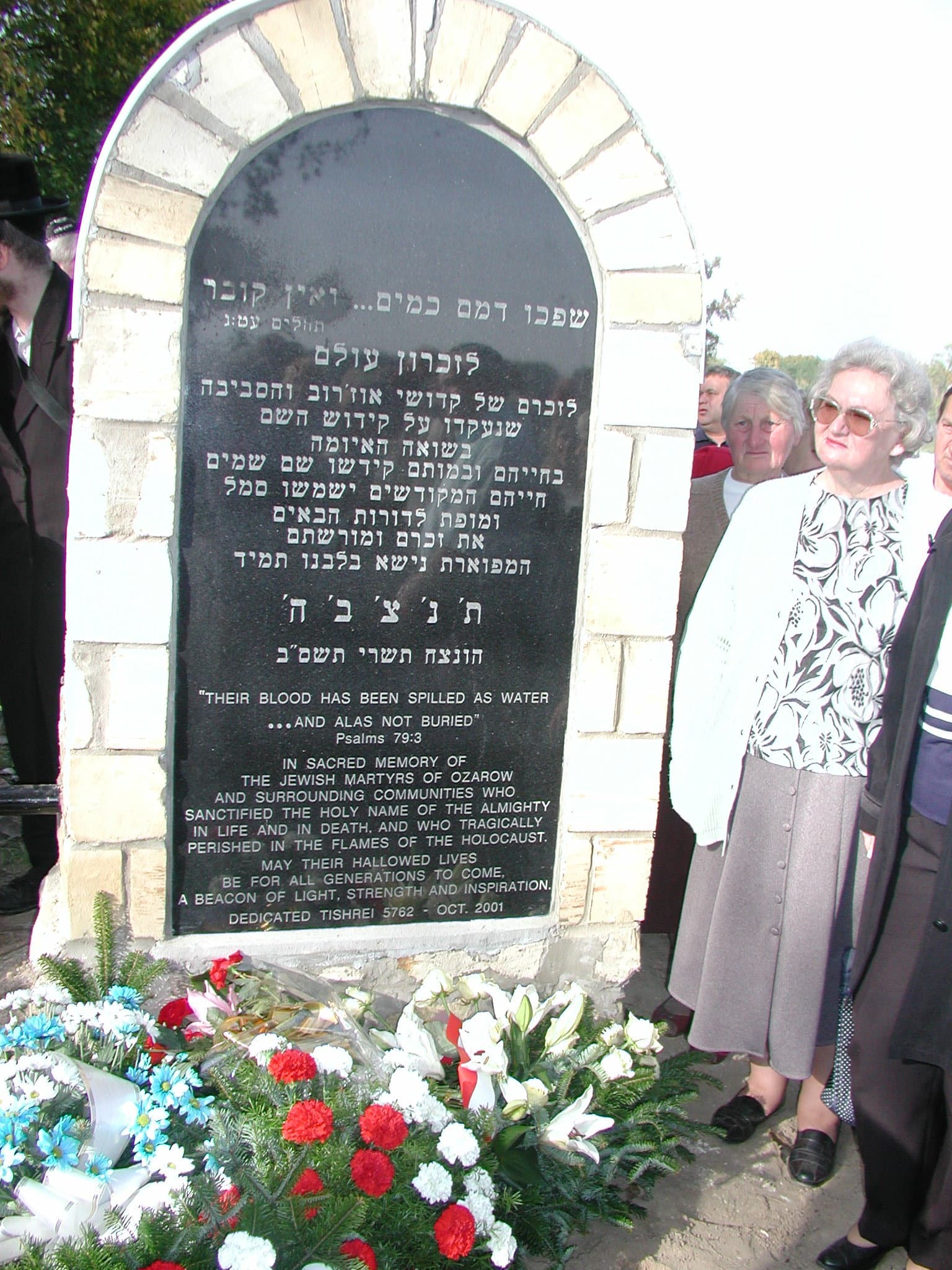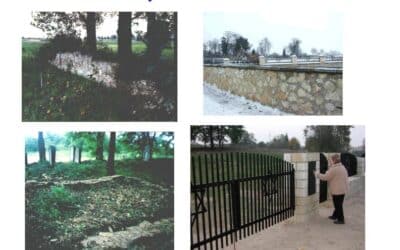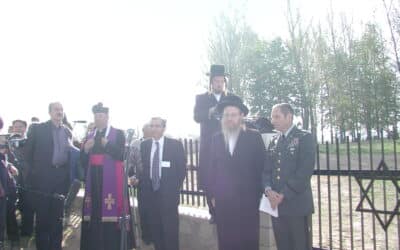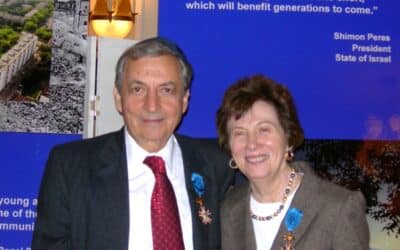Organizations / Poland Jewish Cemeteries Restoration Project (PJCRP)
The Poland Jewish Cemeteries Restoration Project (PJCRP) was founded in 2001 to restore Jewish cemeteries in Poland and provide Holocaust education to communities in Europe and the United States.
Overview
In the years preceding the formation of the Poland Jewish Cemeteries Restoration Project (PJCRP), Norman and Hannah (nee Cohen) Weinberg had diligently worked on their family genealogies. Like many Jewish families in North America, their family roots lay in Eastern Europe where Jewish communities had suffered centuries of antisemitic policies and violence from pogroms to genocide, culminating in the Holocaust.
Founders
Norman and Hannah were born in Toronto, Canada, and both were trained as scientists. Norman Weinberg holds the title of Fellow of the Electrochemical Society, in recognition of his work in the field of electrochemistry. In 1977 the Weinbergs founded a R&D business, and sold The Electrosynthesis Company in 2001 to begin their avocation around Jewish memory and education. Each had family roots in present day Poland, in the small villages of Ozarow and Polaniec. What begun as a decision to restore Norman Weinberg’s family cemetery in the “former shtetl” of Ozarow, became a much larger project to aid other abandoned and uncared for Jewish cemeteries. Through a charitable fund administered by the Foundation for Jewish Philanthropies known as the Poland Jewish Cemeteries Restoration Project (PJCRP) they initiated in Buffalo and in Poland a project that produced a series of interlinked programs, to honor the memory of the deceased as well as Holocaust victims, and to educate current and future generations about Jewish history through communities of connection.
Historic Context
The invasion of Poland by German forces in 1939 imposed systematic plundering, forced ghettoization to Jewish residents, culminating in the “final solution”, when three million Polish Jews were murdered, and half of the 6 million Jews who were annihilated in the Holocaust. During this time, German forces and their co-conspirators desecrated Jewish cemeteries using their gravestones, and their walls and gates to build roads, pavements, fortifications and other structures as part of their war effort and genocidal actions.
Project Goals and Actions
The restoration of Jewish cemeteries in Poland were a concrete way in which Jewish descendants could honor their relatives. It was also a way to connect existing Polish communities, many with no current Jewish residents, with the memory of millions murdered in the Holocaust as part of fostering Holocaust education and a greater understanding of these events as part of world history. There were an estimated 1200 devastated Jewish cemeteries in Polish lands. One of the actions devised by the PJCRP to pay for the labor and materials of this enormous undertaking, was to petition the German Government, asking Germany to pay a share of the costs for remediation of the cemeteries that German forces destroyed and the mass graves that German forces created. This petition received millions of signatures by both Jews and non-Jews and was presented to the German ambassador to Poland with copies also presented to the Polish government, and to the ambassadors of Israel, US, France, Austria and Canada.
Creating a Movement
Through the Poland Jewish Cemeteries Restoration Project, the Weinberg’s created a network of non-Jewish Polish community member volunteers and Jewish volunteers who set out to restore more than 35 cemeteries working closely with Michael Schudrich, Chief Rabbi of Poland and Joseph Macielag, former President of the Polish American Congress. Key to each restoration was the photographing and translating of cemetery monuments, the filming of these restorations as part of learning about the Shoah and Jewish heritage in Poland, tolerance and reconciliation. A significant archive was amassed that as of 2023 is being donated to the office of the Chief Rabbi of Poland.
With Avi Mizrachi and Katharine Gorsuch, the Weinbergs also co-founded the Foundation for Holocaust Education to provide Holocaust education to students in the US, Poland and Belgium. The Foundation supported the development of several initiatives including a school play based on survivor testimony, “Who Returned My Soul” by Kelly D. Brock. This play tells of the life experiences of ten Holocaust survivors who share their lives before, during, and after the Holocaust. The reader’s theater format brings each Holocaust survivor’s story to the foreground with a focus on the text, not the spectacle of the production. It is read by high school students and has provided a new way to understand the complexity and experience of the Holocaust to the next generation.
Honors and Recognition
For their work, both Hannah and Norman Weinberg have been independently and jointly recognized with many awards including the Ayshet Chayil Award (Woman of Valor), to Hannah Weinberg from the Sarasota Jewish Federation in 2015, and the Citizen of the Year Award-Civic Leader, presented to Norman Weinberg by Am-Pol Eagle in 2007 representing the Polish community of Western New York. Together they have received the Guardian of Israel Award in 2014 from the Jewish National Fund, the Community Leadership Award in 2012 from the Buffalo-based Foundation for Jewish Philanthropies and The Order of Merit of the Republic of Poland, as well as the Pursuit of Justice Award in 2002 by the Buffalo Chapter of the American Jewish Committee.
Website
To read more about author and the play, Who Returned My Soul?
Holocaust play tells survivors? stories, The Lake Orion Reviw, CJ Carnacchio, April 9, 2008
Holocaust drama is poignant for students, Herald Tribune, Jay Handelman, January 30, 2013
Holocaust Memorial Center Zekelman Family Campus Newsletter, Summer 2011
Gallery
Ozarow Cemetery, Before and After the Restoration, 2001 Courtesy of Hannah and Norman Weinberg
Ozarow Cemetery, Poland, Before and After the Restoration, 2001
Commemorative Monument unveiled at the restoration of Ozarow Cemetery, October 15, 2001. Courtesy of Hannah and Norman Weinberg
Commemorative Monument, Ozarow Cemetery, Poland, 2001
Ceremony of the restoration of Ozarow Cemetery, Poland, October 15, 2001. Courtesy of Hannah and Norman Weinberg
Ceremony of the restoration of Ozarow Cemetery, Poland, 2001
Order of Merit, Hannah and Norman Weinberg, Republic of Poland, 2008. Courtesy of Hannah and Norman Weinberg.
Award of the Order of Merit to Hannah and Norman Weinberg, Republic of Poland, 2008
Acknowledgements and Thanks
Out thanks to Norman and Hannah Weinberg for sharing their records about the creation and work of the PJCRP.






